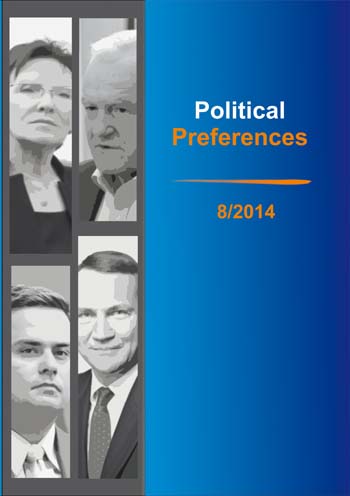Prezydencjalizacja zachowań elektoratu w 2013 roku na tle porównawczym z poprzednim sezonem „niewyborczym”
The Presidentialisation of electoral behaviors in 2013. The comparative perspective with previous non election year
Author(s): Wojciech PeszyńskiSubject(s): Politics / Political Sciences
Published by: Wydawnictwo Uniwersytetu Śląskiego
Keywords: presidentialisation; personalization; party; parties leaders; television debates
Summary/Abstract: In 2012 and 2013, in Poland, did not take place any national election. It was excellent perspective to lead comparison research. The subject of this article is presidentialization of electoral preferences. This process depends on situation, when style of parliamentary campaign has become similarly like presidential election and people focus on parties leaders competition. Usually presidentialisation increased without any changes of election rules. The Author focuses on two aspects: determinantes of decisions in potential parliamentary elections and opinion connected with organizing television debates during campaigns. In the article were compared preferences among electoral five main Polish parties. Results of the polls were compared with effects previous surveys (in 2012), which included two the same questions about presidentialisation. First question (about presidentialisation) apply to determinates of decision in potential parliamentary election. In every parties electoral more respondents choose ‘party option’ than ‘leader variant’. The most questioned, who show party leader, find among Law and Justice (PiS) electoral (26,2 per cent). It could be predicted, because Jarosław Kaczyński (PiS president) is main party symbol and predominant person inside the organization. As surprise can be treated preferences of Civil Platform (PO) electoral. Here value of this ratings reveal 18,3 per cent. In comparison to previous survey (in 2012) it signifies decline about 2,4 per cent. Donald Tusk (the prime minister and PO leader) is the most important component of this party and his attitude was main factor of the winning of two last parliamentary elections (2007 and 2011). Second question apply to organization television debates in every elections. Among electoral every parties find more followers than oppositionists this solution. However in comparison this results to previous polls we can conclude about decrease amount of supporter this postulate. In reality, debates became important element of campaign if politicians understand a role of this issues. But presently political parties and public opinion are not interested in this issue.
Journal: Political Preferences
- Issue Year: 2014
- Issue No: 8
- Page Range: 11-27
- Page Count: 17
- Language: Polish

